
Why do two men from very similar socioeconomic and educational backgrounds sometimes take very different life paths?
Is nature or nurture more important in determining a man’s success in his relationships and career?
What physiological and psychological traits present in a man’s younger years predict his chances of living a long, flourishing life?
In 1938, researchers at Harvard’s medical school began a study that aimed to answer these fascinating questions and discover what factors lead to an “optimum” life. The study recruited 268 of the university’s sophomores from the all-male classes of 1939-1944, and set out to examine every aspect of their lives for at least a couple decades. The men selected were healthy in body and mind, and deemed likely to capitalize on their potential and become successful adults. While many of them came from well-off families, some were intelligent students who had been plucked from poor households and given full scholarships.
The study’s participants were signing on for extensive probing into their lives. They were given physicals and thorough psychological evaluations; researchers visited their homes to interview their parents, as well as three generations of relatives; each year the men filled out an exhaustive questionnaire that inquired about numerous aspects of their health, habits, family, political views, career, and marriage; and every 10-15 years, the men were interviewed face-to-face.
This research project, known as the Grant Study, continues today, more than 75 years after its inception. Having been extended numerous times, it has become one of the longest longitudinal studies ever conducted. When George Vaillant, who has been the study’s director for several decades, first started working on the project, he was thirty-two, and the participants were in their fifties; today, Vaillant is pushing eighty, and the men are in their nineties. The participants continue to fill out their annual questionnaires, and Vaillant continues to study their answers.
Nothing quite like the Grant Study has ever been attempted; as Vaillant puts it, this research represents “one of the first vantage points the world has ever had on which to stand and look prospectively at a man’s life from eighteen to ninety.” The mountains of data collected over more than seven decades has become a rich trove for examining what factors present in a man’s younger years best predict whether he will be successful and happy into old age. The study’s researchers have continually sifted through the results and reports in an attempt to ferret out these promising elements. As Vaillant details in The Triumphs of Experience, some of the researchers’ original hypotheses did not pan out, and the job of untangling issues of causation and correlation goes on. Yet several insights have emerged very strongly and prominently from the data, offering brightly marked guideposts to a life well lived.
The Importance of Relationships
To discover what factors predicted a man’s ability to become a successful, well-adjusted adult, Vaillant created a list of ten accomplishments, which included career success and professional prominence, mental and physical health, a good marriage, supportive friendships, closeness to one’s children, the ability to enjoy work, love, and play, and a subjective level of happiness. He called this set of accomplishments the “Decathlon of Flourishing”, and measured the level to which each man in the study had achieved these “events” between the ages 65-80. Vaillant then looked back over the men’s personal histories to figure out what factors present earlier in the men’s lives most predicted their Decathlon score.
When Vaillant crunched the numbers, he discovered no significant relationship between a man’s level of flourishing and his IQ, his body type (mesomorph, ectomorph, endomorph), or the income and education level of his parents.
The factors that did loom large, and collectively predicted all ten Decathlon events, had one thing in common: relationships. This rubric included:
- A warm, supportive childhood
- A mature “coping style” (being able to roll with the punches, be patient with others, keep a sense of humor in the face of setbacks, delay gratification, etc.)
- Overall “soundness” as evaluated during college years (resilient, warm personality, social, not overly sensitive)
- Warm adult relationships between the ages of 37-47 (having close friends, maintaining contact with family, being active in social organizations)
Vaillant found that the men who had the best scores in these areas during their youth and mid-life, were the happiest, most successful, and best adjusted in their latter years. This is the finding of the Grant Study that has emerged most prominently: “It was the capacity for intimate relationships that predicted flourishing in all aspects of these men’s lives.”
The powerful effect of intimate relationships can be seen in a variety of factors in a man’s life, including their income levels:
- Men with at least one good relationship with a sibling growing up made $51,000 more per year than men who had poor relationships with their siblings, or no siblings at all
- Men who grew up in cohesive homes made $66,000 more per year than men from unstable ones
- Men with warm mothers took home $87,000 more than those men whose mothers were uncaring
- The 58 men with the best scores for warm relationships made almost $150,000 more per year than the 31 men with the worst scores
Remember that these men all entered the workforce with a Harvard education. Also remember that their parents’ socioeconomic status turned out not to be a significant factor in their own future income.
In addition to finding that warm relationships in general had a positive impact on the men’s lives, Vaillant uncovered specific effects that stemmed from a man’s childhood, and from the respective influence of his mother and father.
The Impact of a Man’s Childhood
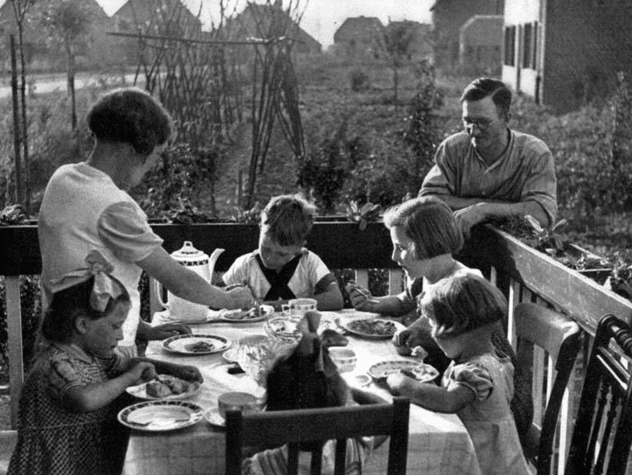
“Woe to the man whose heart has not learned while young to hope, to love, to put its trust in life.” –Joseph Conrad
In order to gauge the effect of a man’s childhood on his future prospects in life, Vaillant scored the quality of the participants’ upbringing according to these criteria:
- Was the home atmosphere warm and stable?
- Was the boy’s relationship with his father warm and encouraging, conducive to autonomy, and supportive of initiative and self-esteem?
- Was the boy’s relationship with his mother warm and encouraging, conducive to autonomy, and supportive of initiative and self-esteem?
- Would the rater have wished to grow up in that home environment?
- Was the boy close to at least one sibling?
When the outcomes of the men’s lives were analyzed, and compared to this set of criteria, it became quite clear that “for good or ill, the effects of childhood last a long time.” A warm childhood proved a much stronger predictor of many aspects of a man’s flourishing later in life, including his overall contentment in his late seventies, than either his parent’s social class or his own income. These effects are particularly striking when the men with the warmest childhoods (who were dubbed “the Cherished”) are compared with those in the bottom tenth (who were called “the Loveless”):
- The Cherished made 50% more money than the Loveless
- The Cherished were 5X more likely to enjoy rich friendships and warm social supports at age seventy
- The Loveless were 3.5X more likely to be diagnosed as mentally ill (which includes serious depression, abuse of drugs and alcohol, and need for extended psychiatric care)
- The Loveless were 5X more likely to be unusually anxious
- The Loveless took more prescription drugs of all kinds, and were twice as likely to seek medical attention for minor physical complaints
A loving, supportive upbringing seemed to both bolster a man’s chances for success in his relationships and career, and inoculate him against future psychological distress.
A Loving Childhood Develops Independence and Resilience
While parenting pundits at various times in our history have worried that a household full of unwavering love and support could turn out a young man who was too coddled and dependent, the Grant Study found that abundant familial love, when coupled with an emphasis on autonomy and initiative, actually produced the most stoical (able to keep a stiff upper lip) and independent men. Such men, Vaillant explains, had learned to be comfortable with their feelings, and “that they could put their trust in life, which gave them courage to go out and face it.” In contrast, the men from the worst childhoods turned out to be the most dependent, and struggled with taking initiative.
This correlation held up even when examined in relation to the traditionally masculine pursuit of attaining military rank. Since the Grant Study began at the outset of WWII, its researchers were naturally interested in tracking which aspects of the men’s physical and psychological make-up would best predict their likelihood of becoming officers during the war. They found that the rank the men had attained at the time of their discharge had no relation to their body type, intelligence, or their parents’ social class. Instead, higher rank was most strongly correlated with a loving childhood, and whether a man had warm relationships with his mother and siblings. “Twenty-four of the twenty-seven men with the warmest childhoods made at least first lieutenant, and four became majors. In contrast, of the thirty men with the worst childhoods, thirteen failed to make first lieutenant, and none became majors.” As Vaillant concludes, “We don’t breed good officers; we don’t even build them on the playing fields of Eton; we raise them in loving homes.”
What Goes Right Matters More Than What Goes Wrong
In studying the powerful impact a man’s childhood has on his prospects for health, happiness, and success, an important corollary was discovered: “it is not any one thing for good or ill—social advantage, abusive parents, physical weakness—that determines the way children adapt to life, but the quality of their total experience.” Basically, what the Grant Study found is that even if a lot of bad things happen during your childhood, if they’re outweighed by the good things, you’ll still turn out okay. So if, say, a man had an absent father but a warm relationship with his mother and siblings, or cold parents, but loving grandparents, his prospects for future flourishing were still good. It was not any one factor, or constellation of factors, Vaillant reports, but the quality of one’s childhood as a whole that mattered most.
This point is driven home by the findings of a study that was done in tandem with the Grant Study. Since the participants in the Grant Study were not a terribly diverse group, in 1940 researchers began to run the Gluek Study alongside it, which included a second cohort of 456 disadvantaged non-delinquent inner-city youths from the Boston area. When the childhoods of the men in this study were examined, it was found that even if the family was poor, the father was on welfare, and the family had numerous other problems, sons who were loved by their mothers, admired their dads, and had good friendships went on to become successful and attain a higher socioeconomic status. This explains why men who grew up in impoverished households, but who go on to flourish anyway, often say things like, “Even though we were poor, we never realized it when we were children, because our parents made our home such a wonderful place.”
Vaillant further found that in both studies, “Even the death of a parent was relatively unimportant predictively by the time the men were fifty; by the time they were eighty, men who had lost parents when young were as mentally and physically healthy as men whose parents had lovingly watched them graduate from high school.”
The Influence of a Mother
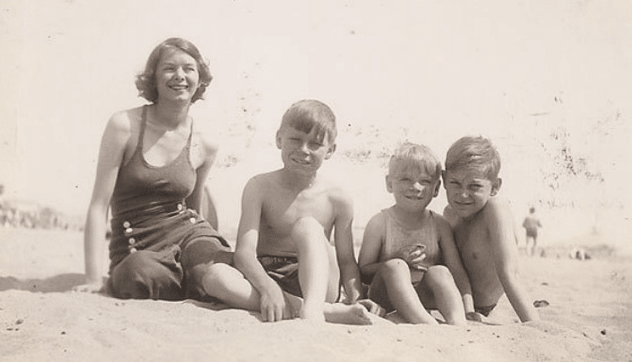
Not only did a man’s overall childhood experience greatly impact the rest of his life, but his mother and father each influenced it in a particular way. The Grant Study found that a warm relationship with his mother was significantly associated with a man’s:
- effectiveness at work
- maximum late-life income
- military rank at the end of WWII
- inclusion in Who’s Who
- IQ in college
- Verbal test scores
- Class rank in college
- Mental competence at age 80
On the flip side of that last point is the fact that “a poor relationship with his mother was very significantly, and very surprisingly, associated with dementia.” Men who lacked a warm relationship with their mothers were 3X more likely to get dementia in their old age.

One of the findings of the study that I personally found most interesting, was that “a mother who could enjoy her son’s initiative and autonomy was a tremendous boon to his future.” Mothers of men who scored highly on the Decathlon of Flourishing admired their sons’ assertiveness, and boasted to researchers that their boys were “fearless to the point of being reckless,” “could fight any kid on the block,” and “is a tyrant in a way that I adore.” In other words, mothers who celebrated their boys’ boyishness bolstered their chances of achieving a successful, mature manhood.
The Influence of a Father
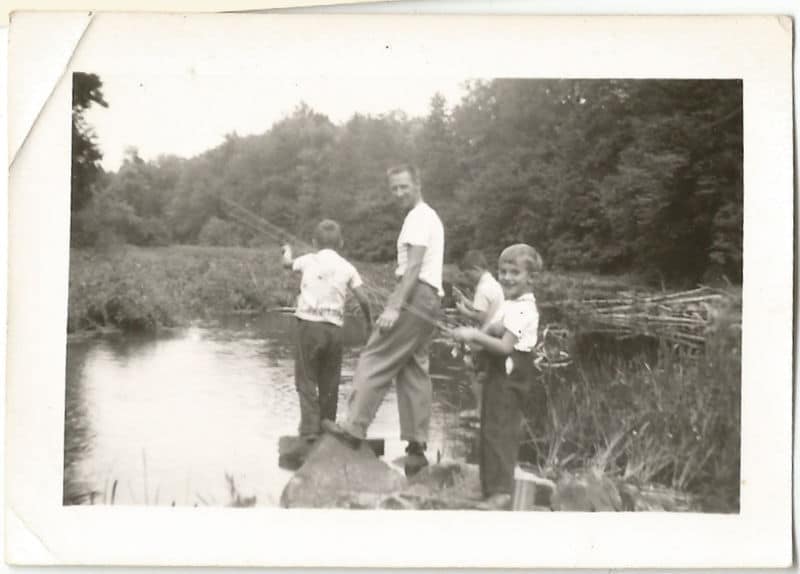
The Grant Study also found influences that were associated exclusively with dads. Loving fathers imparted to their sons:
- enhanced capacity to play
- more enjoyment of vacations
- greater likelihood of being able to use humor as a healthy coping mechanism
- better adjustment to, and contentment with, life after retirement
- less anxiety and fewer physical and mental symptoms under stress in young adulthood
In the negative column, it “was not the men with poor mothering but the ones with poor fathering who were significantly more likely to have poor marriages over their lifetimes.” Men who lacked a positive relationship with their fathers were also “much more likely to call themselves pessimists and to report having trouble letting others get close.”
If there was ever any doubt, fathers matter, a lot: When all is said and done, a man’s relationship with his father very significantly predicted his overall life satisfaction at age 75 — “a variable not even suggestively associated with the maternal relationship.”
The Mysterious Influence of the Maternal Grandfather
When Grant Study researchers examined whether the longevity of a man’s immediate relatives affected his chances of flourishing, they found that the age of death of his mother, father, maternal grandmother, and both paternal grandparents wasn’t associated at all with his Decathlon score. Yet there emerged a “marked and unexpected association between age at death of maternal grandfathers [MGFs] and the mental health of their grandsons”:
- The MGFs of men with the highest scores on the Decathlon of Flourishing lived nine years longer than the men with the lowest scores
- The MGFs of the men who never saw a psychiatrist lived nine years longer than the men who made the most visits to psychiatrists
- The MGFs of the most psychologically healthy men lived 15 years longer than the MGFs of the men who were most depressed
- The MGFs of the men with the least anxiety lived 27 years longer than the MGFs of the most anxious men(!)
From these intriguing data points, Vaillant concludes that “long-lived maternal grandfathers predict unusual psychological stability in their grandsons.” Why this would be is still unknown – it may be that a man’s mental health is partly genetic and springs from the MGF.
Men and Marriage

A man’s relationships in childhood were not the only ones that affected his life’s outcome. His friendships in mid-life also played a role, as did, of course, the quality of his marriage.
When several decades ago Vaillant evaluated the men according to “Adult Adjustment Outcome determinations” (a kind of earlier version of the Decathlon of Flourishing, from what I gather), he found that:
“all of the fifty-five Best Outcomes had gotten married relatively early and stayed married for most of their adult lives. (And by the time those men were eighty-five, we learned later, only one marriage had ended in divorce.) In contrast, among the seventy-eight Worst Outcomes, five had never married, and by seventy-five years of age, thirty-five (45 percent) of the marriages had ended in divorce. Proportionately three times as many of the Best Adjusted men enjoyed lifelong happy marriages as the Worst.”
The effect of marriage was even starker for the inner-city men of the Glueck Study: “two-thirds of the never-married were in the bottom fifth in overall social relations, 57 percent were in the bottom fifth in income, and 71 percent were classified by the Study raters as mentally ill.”
These results were not too surprising – marriage has been found to correlate to better life outcomes for men in other studies as well. But Vaillant did make a few other findings that were less expected:
- Earlier in his career, Vaillant had supposed that divorced men would not fare any better in their second marriages – that their first marriages had failed because of psychological traits and behaviors that would similarly doom future attempts at matrimony. But when he checked in with the men at age eighty-five, 23 of the surviving 27 divorced and remarried men were in happy marriages that had lasted for an average of 30 years. The failure of a first marriage did not mean a man was incapable of succeeding the second time round.
- The single most important factor in all the study participants’ divorces was alcoholism – either the men’s or their wives. 57% of the divorces could be traced to it. While the wives were usually open about their husbands’ drinking problems, the husbands were often reluctant to talk about their wives’ alcoholism, and it thus took almost 70 years for this finding to emerge.
- While co-dependence is often a dirty word in our culture, spouses’ mutual dependence on each other was associated with happy and healthy marriages.
- This dependence deepens with time, as does the happiness of marriages. When the men were ages 20-70 only 18% reported that their marriage had been consistently happy (as opposed to so-so or unhappy) for at least 20 years. (The lowness of this number may partially be a generational thing – the WWII generation had different criteria in choosing a spouse and expectations for the relationship.) But at age eighty-five, 76% said their marriages were happy. In old age, spouses increasingly rely on each other, and with the passing of time we tend to remember only the good and forget the bad.Husbands and wives truly grow more precious to each other as they enter the twilight of their lives.
Overall, the Grant Study showed that a happy marriage is an incredibly positive thing in a man’s life. What then makes for wedded bliss? Vaillant doesn’t delve too much into that question, but holds up what is perhaps the most successful marriage in the study as an example. This couple, who Vaillant calls “the Chipps” (a pseudonym), enjoyed doing various activities — they regularly sailed, took a yearly canoeing trip to Nova Scotia, and walked 3 miles a day together. They always kept a sense of humor about everything. Instead of resorting to passive aggression, husband and wife talked openly talked about their issues and “even conflict was filled with laughter.” By the time this gentleman was 80, “he (and his wife) had been giving their marriage rave reviews for six decades”; “I’ve lived happily ever after,” he gushed to his interviewer. Indeed, as Vaillant looked through his notes on him, he found he had written that Mr. Chipps was “perhaps the happiest man in the study.”
Hope for Those Who Had an Inauspicious Start in Life

In looking over the association between childhood, marriage, and the trajectory of a man’s life, Vaillant concludes that “The majority of the men who flourished found love before thirty, and that was why they flourished.” Whether familial, romantic, or even platonic, men who enjoyed warm relationships in their youth went on to live the fullest, happiest, most successful lives.
Why would this be so? Men who were loved, and learned to love in their younger years, develop positive mental health, resilience, and a capacity for intimacy — qualities that “reflect the process of replacing narcissism with empathy” and lead to greater confidence, autonomy, social and emotional intelligence, and maturity. These traits in turn lead not only to more relationships, but success in other areas (like one’s career). In contrast, men who had bleak childhoods have a harder time forming intimate relationships, are more likely “to be pessimistic and self-doubting,” and are “handicapped later in mastering the assertiveness, initiative, and autonomy that are the foundation of successful adulthood.”
For those readers who enjoyed warm, loving support in their younger years, the above findings have likely been an interesting look at some of the reasons they’ve been able to find a positive path in life. For those who are currently or hope to one day be fathers, it hopefully inspires you to create a warm and nurturing household for your own children.
But for readers whose upbringing left much to be desired, these findings may seem depressing and fatalistic. Yet all hope is not lost. The Grant Study does show that a grim childhood definitely stacks the deck against you – there’s no way around that. But the study also revealed that “people really can change, and people really can grow. Childhood need be neither destiny nor doom.” Some of the participants who had an inauspicious start in life were able to turn their lives around, and go on to flourish in their later years. How did they do it? Vaillant points to “restorative marriages and maturing [psychological] defenses” as “the soil out of which new resilience and post-traumatic growth emerge.”
Marriage as a Healer

As we have seen, a warm childhood strongly predicted a man’s score in most of the events in the Decathlon of Flourishing. But not all of them. Vaillant was surprised to find that “bleak childhoods were not always associated with bleak marriages”:
“With the exception of a man’s closeness to his father, childhood environment did not predict stable marriage, and even where a warm paternal relationship was lacking, good marriages could be made—eventually. Indeed, marriage seemed to be a means for making good on a poor childhood. After almost fifty years of following disadvantaged youths, psychologist Emmy Werner noted that ‘the most salient turning points . . . for most of these troubled individuals were meeting a caring friend and marrying an accepting spouse.’”
Vaillant found that the men in the study who hadn’t learned to love, and be loved as a boy, but who went on to flourish against the odds, used marriage as a second chance to figure out the landscape of intimacy. (Having children provided a similar opportunity to open their hearts in a new way.) While Vaillant found that “The most dependent adults came from the most unhappy childhoods,” as mentioned above, mutual dependence can actually be a healthy thing. For these men, it indeed turned out to be quite healing. Ultimately, marriage, “however imperfect, is an opportunity to assuage some of the loneliness of bleak early years.”
What’s even more interesting is that while many folks think that two people with “baggage” will have a tough time making a go at a successful marriage together, Vaillant found that this was not necessarily the case: “It turned out that happy marriages after eighty were not associated either with warm childhoods or with mature defenses in early adulthood—that is,you don’t have to start out ‘all grown up’ to end up solidly married.” Instead, marriage might just be the best “classroom” for learning how to be a mature man.
Mature Defenses
Beyond warm relationships, two of the factors that most strongly predicted a man’s Decathlon score were mature defenses and character traits.
Mature defenses are our “involuntary psychological coping style” – the ways we instinctively respond to and deal with setbacks, frustration, pain, etc. Immature defenses include things like passive aggression, projection, and denial. They seek to put the responsibility for what happens on other people. In contrast, men with mature defenses take ownership of what happens to them, and try to figure out a healthy way to deal with life’s challenges. These healthy coping methods include things like keeping a sense of humor, finding a gratifying alternative when you can’t get what you want, being altruistic, and facing problems with resilience and stoicism. Mature defenses are a huge factor both in rewarding relationships, and success in one’s career; the twelve men with the most mature coping styles made over $200k more a year than the sixteen men with the most immature coping styles.
Vaillant points out that these mature defenses can unfortunately not be developed through willpower alone – your upbringing, environment, and even genetics play a role. But they are at least partially under your control, and can be actively strengthened and developed throughout your life.
Character Traits
There are also several character traits strongly associated with flourishing, and their cultivation is happily within our control to a greater degree.
When Vaillant looked at 26 personality traits the men in the Grant Study had been evaluated on in college, he found that a trait called “Practical, Organized” best predicted their mental health in middle-age. This trait involves, obviously, the ability to organize one’s life, as well as to delay gratification. In a related study, “prudence, forethought, willpower, and perseverance in junior high school were the best predictors of vocational success at age fifty.”
Vaillant uncovered another related trait that correlated with a whopping 8 Decathlon events: “Well Integrated.” Men who were “well integrated” were deemed to be “steady, dependable, thorough, sincere, and trustworthy,” while those who were Incompletely Integrated lacked perseverance and were seen as “erratic, unreliable, sporadic, undependable, ill directed and little organized.” Compared to the Incompletely Integrated, the Well Integrated men:
- Were 4X more likely to enjoy a good marriage
- Lived, on average, seven years longer
- Were significantly more likely to be physically active and cognitively intact in old age
Being Active

Finally, while body type turned out not to predict a man’s score on the Decathlon of Flourishing, athletic prowess was in fact strongly associated with it. That is, it seems that while the body type a man was born with didn’t affect the trajectory of his life, what hedid with that body mattered (remember that Churchill was born an endomorph and fought it every step of the way!). This association between fitness and flourishing may possibly be chalked up to the benefits that physical training provides; staying in shape, as we know, can strengthen our discipline, boost our minds, and impart metaphorical life lessons as to the importance of things like humility and consistency. It is perhaps for this reason that the participants’ performance in a physical test of endurance turned out to be a better predictor of their ability to form successful relationships than even of their health later in life. Exercise makes us better people.
Whatever Your Upbringing, You Can Become the Man You Want to Be
That qualities like organization, discipline, and dependability would so strongly predict flourishing in middle and late life should not be surprising; they are, Vaillant notes, “precisely the traits people need to find ways around failures, and make the most of successes when they come along.” So too they are fortunately qualities that we can develop in ourselves, no matter how much, or how little, training we got in them in our youth. Those who were never taught as a boy the importance of scheduling their time, persevering in the face of setbacks, and developing their trustworthiness will certainly have a tougher row to hoe, but learning these skills is possible at any age.
While it is easiest to pick up new habits before your mid-twenties, when your brain is most pliable, our brains remain plastic and moldable throughout our lives. In fact, the process of myelinization – which increases the efficiency of our neurons – continues up until age 60. During that time, our prefrontal lobes (which function as the practical, organized, CEO of our brains) can become better and better at checking the limbic parts of our brains (which cause us to be unthinkingly impulsive). Thus Vaillant found that the study participants, regardless of their upbringing, could grow over time – could become wiser, more patient, more mature. The more such traits are actively sought, and exercised, the more you can aid and accelerate that process. So start working on your character early if you can, and continue to practice the qualities of mature manhood in every decade of your life. As Vaillant notes, ultimately what the men “did with a loving or bleak childhood had as much to do with future success as the childhood itself.”
Conclusion: Love Is All You Need (Even When You’re a Dude)
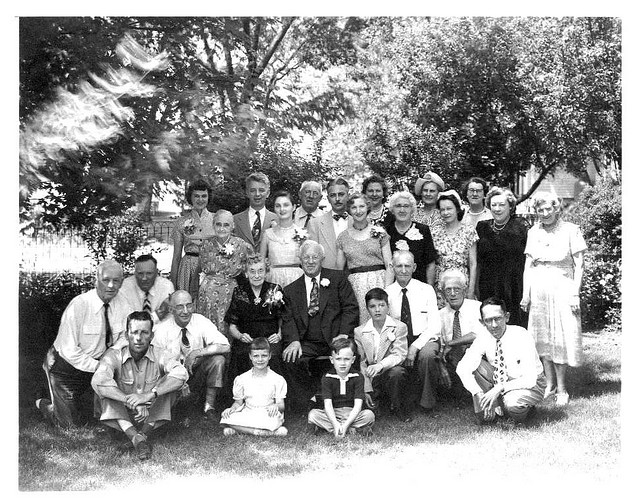
“The recent years of the Grant Study have shown that our lives when we are old are the sum of all of our loves.” –George Vaillant
What leads to a flourishing life has been debated and discussed for centuries. Is it your parents’ social class? It is a career with a high income? Is it the type of body you’re born with?
After decades of studying the scope of men’s lives from ages 18-90, Valliant’s answer is this: “Happiness is love. Full stop.” It’s really a conclusion all of us knew all along, but it helps to be reminded of it, and to see that it is backed up not only by intuition, but by nearly 80 years of research.
Character traits matter too, but even then their real importance is helping us replace a scattered narcissism with the steady maturity that leads to rewarding relationships. Perhaps it sounds cheesy, but we are ultimately here to love, and to be loved. Love leads to our ability to “put our trust in life” and the confidence to tackle our goals. Thus if we fill our lives with warm, rich relationships, all the other good stuff – career success, prestige, adventure – will be sure to follow.
__________
Source:
The Triumphs of Experience: The Men of the Harvard Grant Study by George Vaillant

















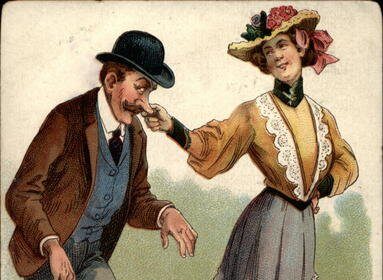




Show Comments